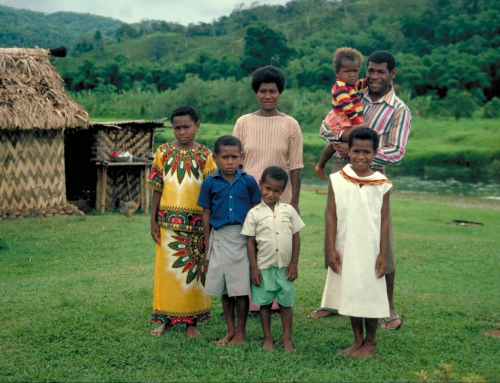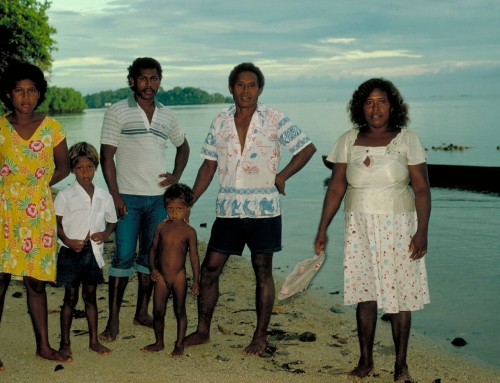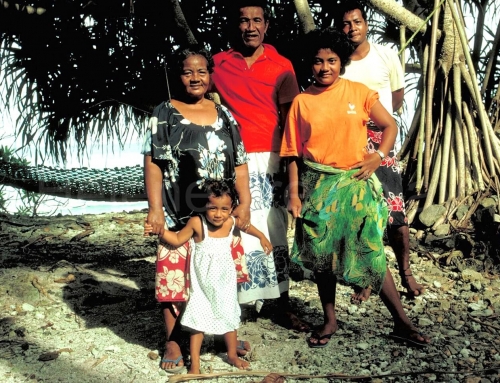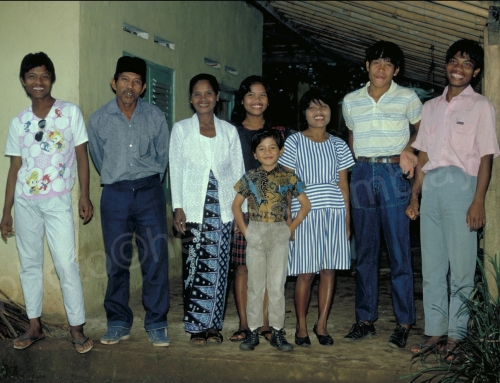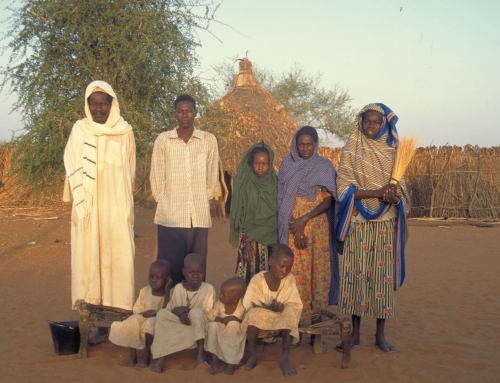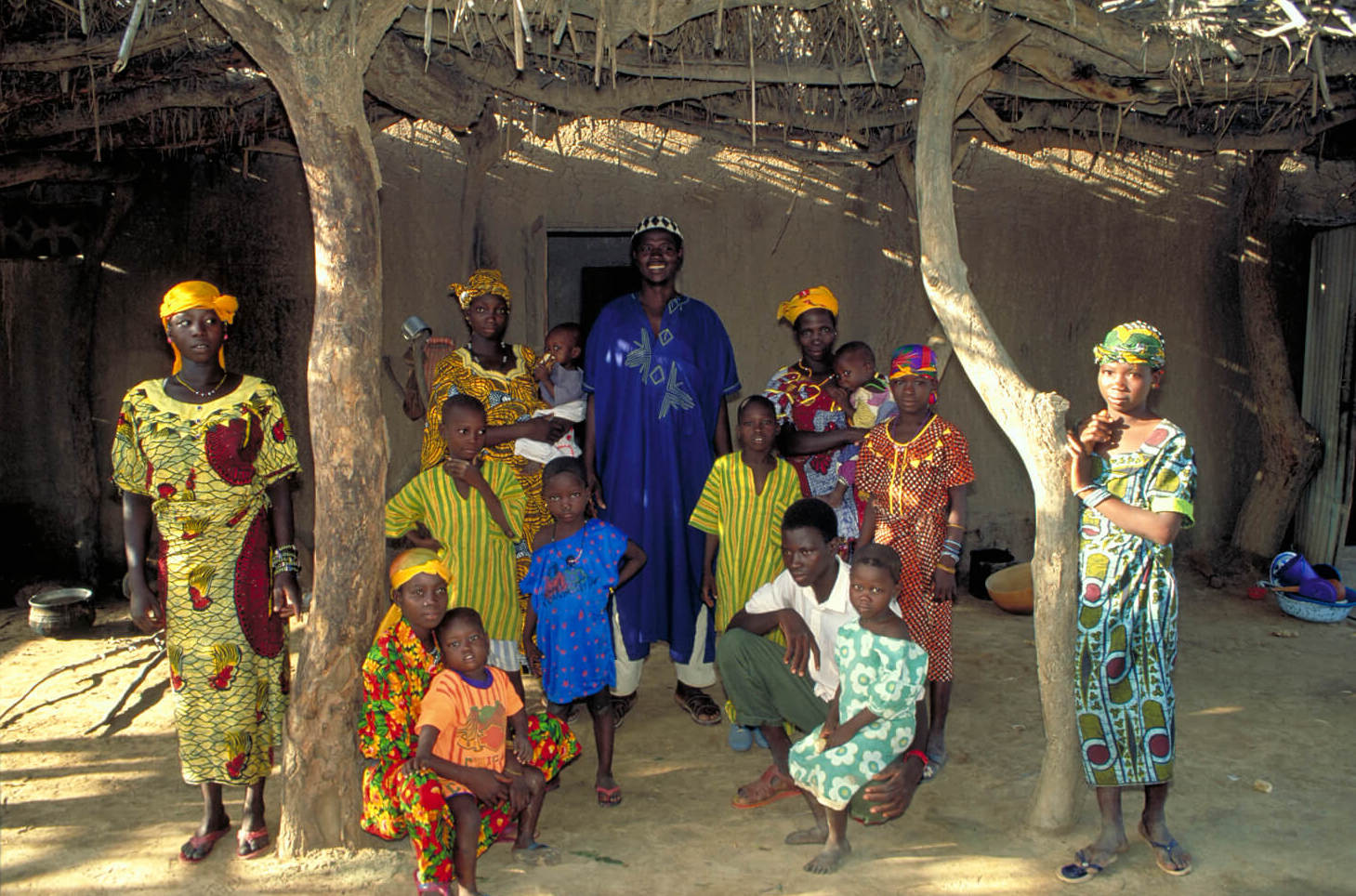
60 head of beef
50 sheep
20 goats
2 donkeys
3 ducks and ducklings
Many chickens
Ladji Mallé’s family
Ladji Mallé, age 45, (1)
Mousofoulo (first wife) Fatoumala (Satou) Coulibaly ,38
Aglae, 21,
Djènèba, 19, absent
Sofiatou, 14,
Aramatou, 12,
Arné, 10,
Nemetou, 5, girl
Diakaridia, 15-months
Three children died
Mousofoulana (second wife) Sanata Traoré, 30,
Saly, 10
Mamoutou, 8,
Bahoumou, 4,
Alassane, 3,
Abassou, 16 months
Two children died
Cognomousso (the one who has newly come) Sitan Mallé, 16
Kombré Village
September 23
Sitan is the cognomouso, which means the newly wed.
4:00 The rooster’s second crow is Sitan’s signal to wake up. She has no difficulty since it is her habit and also she went to bed early because of the heavy rains and the thunder and lightning.
Sitan is the cognomouso, which means the newly wed. She arrived during the month of May to become Ladji’s third wife. At 16, she knows what a woman and wife should do. Her arrival means less work for the older wives Satou and Sanata. Together the three women will now share the daily chores.
The next two days are Sitan’s turn to receive and care for her husband and cook for the entire family. She must heat water for Ladji before 6 a.m. so he can wash before the first of his five compulsory daily prayers to Allah. Sitan must also cook for her husband and the family.
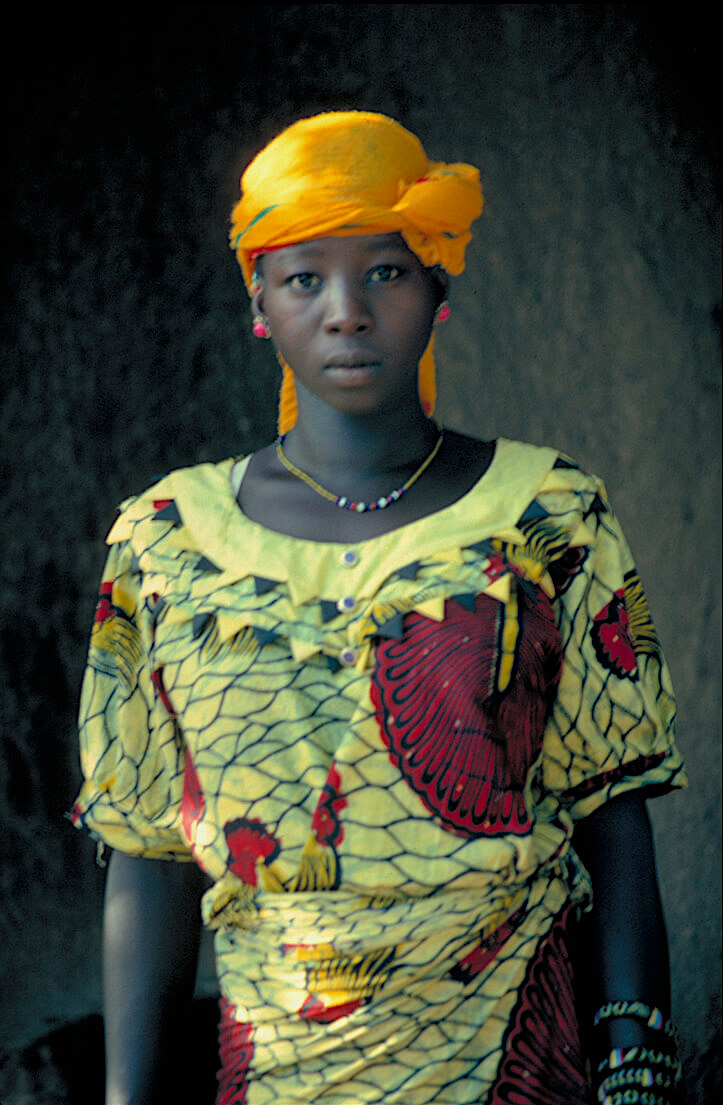
She crosses the family’s large courtyard. It is still dark and the ground is wet but not as wet as it should be. These are the last days of the rainy season and despite the fields covered with sorghum, millet, cotton and groundnuts, the villagers know that the harvest will not be large enough to make it through the long dry season ahead.
Sitan gets embers from the fire where the nere (wild plant used for making sauce) has been cooking all night. She lights the cooking fire in the southwest corner of the walled courtyard. She lights another fire near Ladji’s door to heat water for his bath.
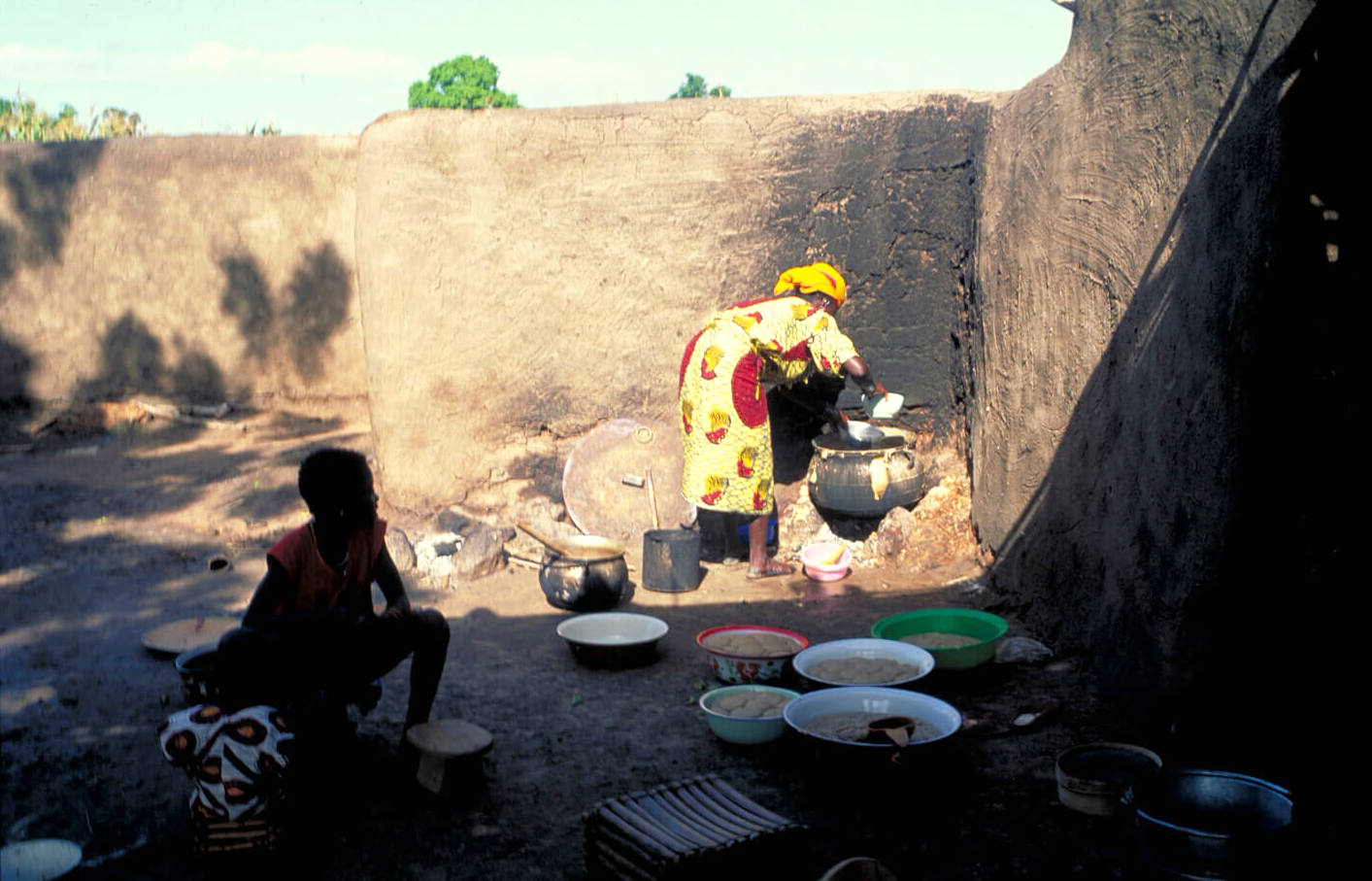
She has a piece of land just to keep her busy
In the southeast corner, Fatmata Fomba lights her own fire. She is the youngest wife of Soulouman Malle, Ladji’s father. She is much younger than her husband and even though she has reached an age where she should rest and be served, she is full of energy and cannot stay still. So, as it is done more and more in the family, tradition was put aside and she has been allowed a piece of land just to keep her busy. A neighbor comes in quietly through the small back door to get some embers from Fatmata’s fire. The two women exchange morning greetings.
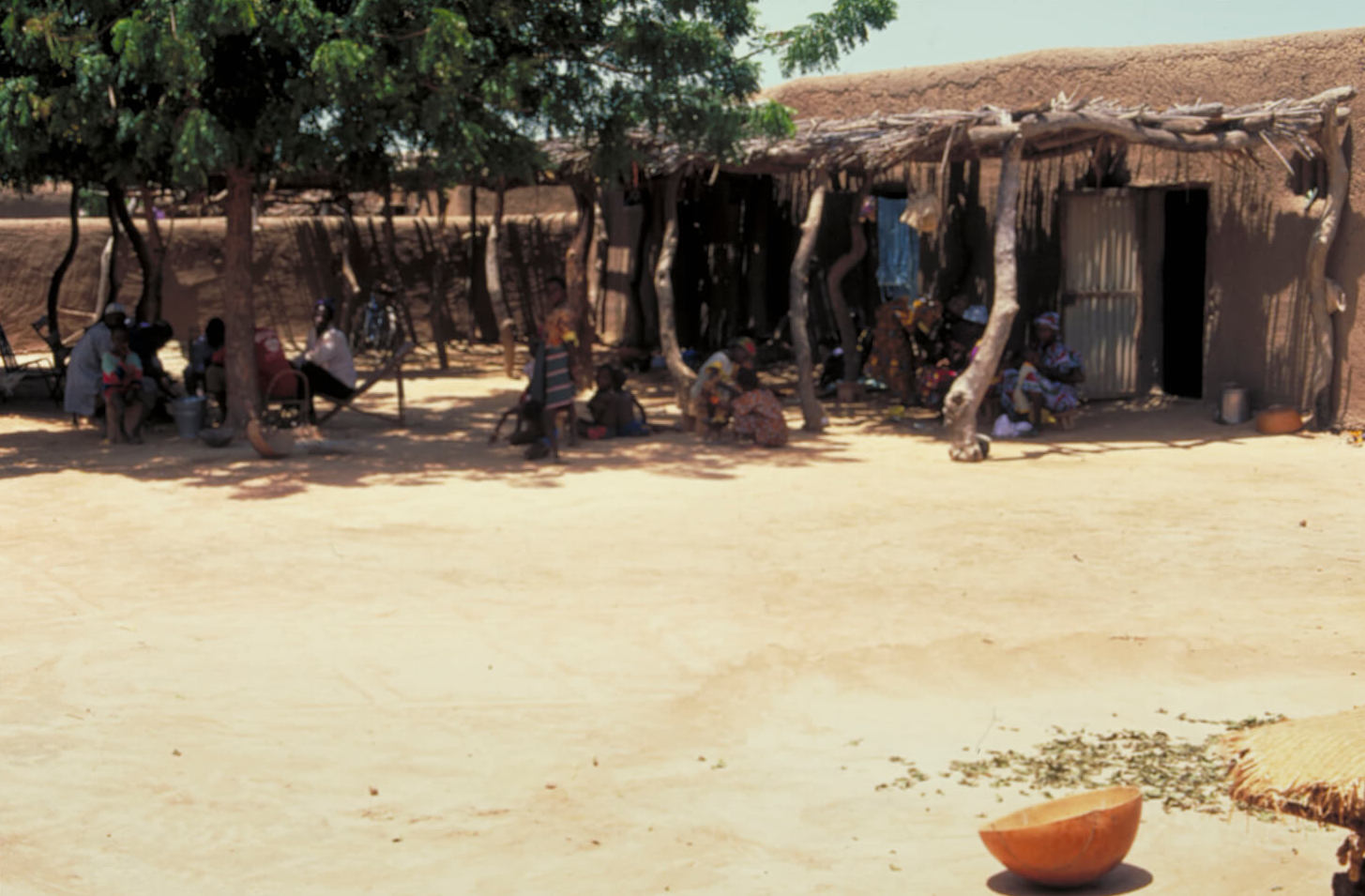
The architecture of the family compound is of Muslim origin.
All doors open towards an inner courtyard protected by high walls.
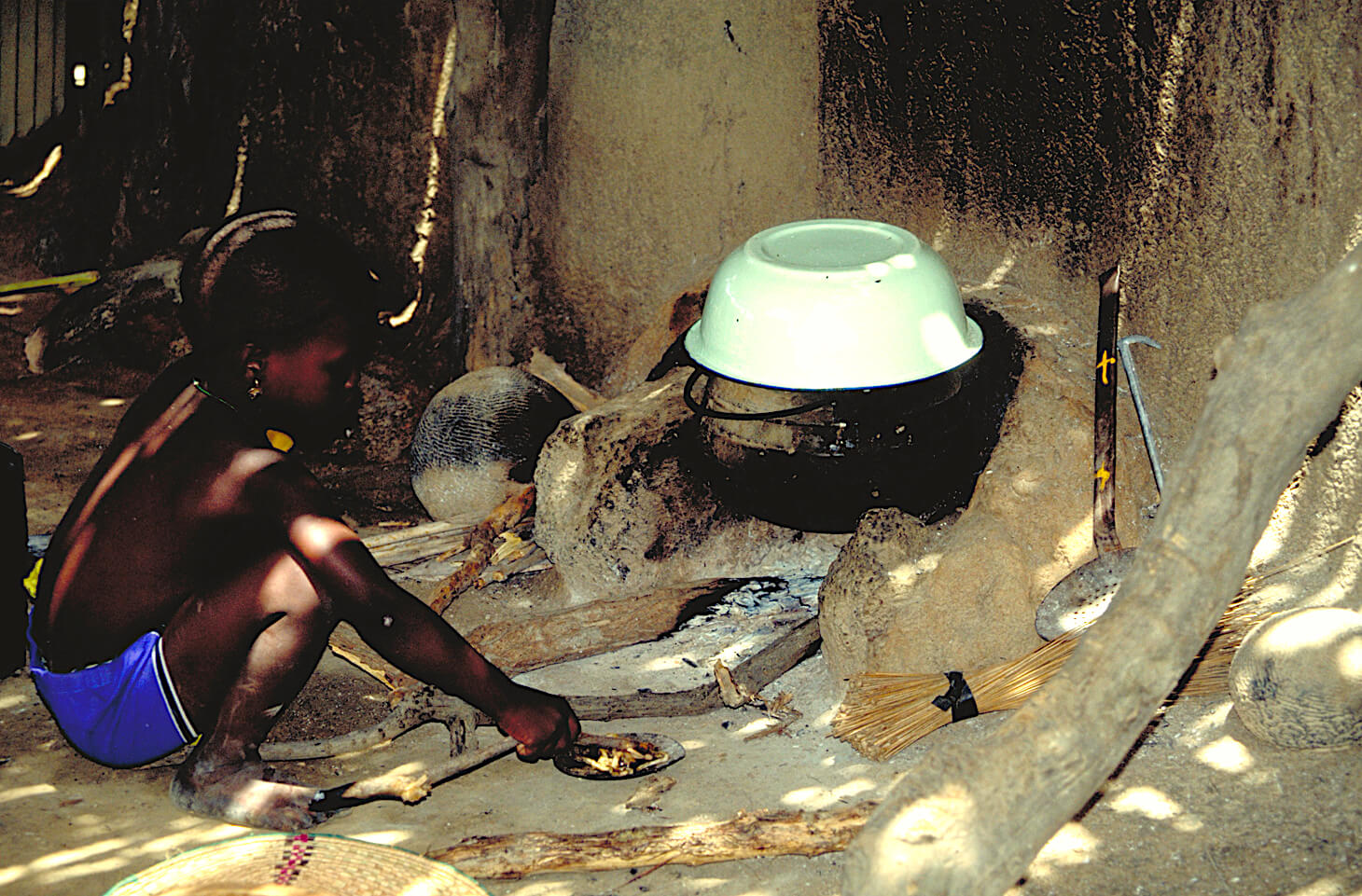
The doors open
5:30 Four fires are now crackling in the yard as the sun breaks through the dark night. Two roosters crow answering each other with louder and louder calls until the hens and ducks head off along the village’s dirt lanes in search of a quieter place.
Diakaridia cries for his mother’s breast, water pails bang back and forth from the well, dishes clink, grain is pounded – morning noises cause the village to stir and doors to open.
There are 13 doors in the family compound and as many rooms: one for Ladji, three for his wives including their smaller children, two doors for the older boys, one for old Soulouman Malle, another for his first wife, one for the kitchen utensils where the old man’s second wife sleeps with many young children, two for grain, one for farm tools, one to put away the chairs at night, and another for television and video.
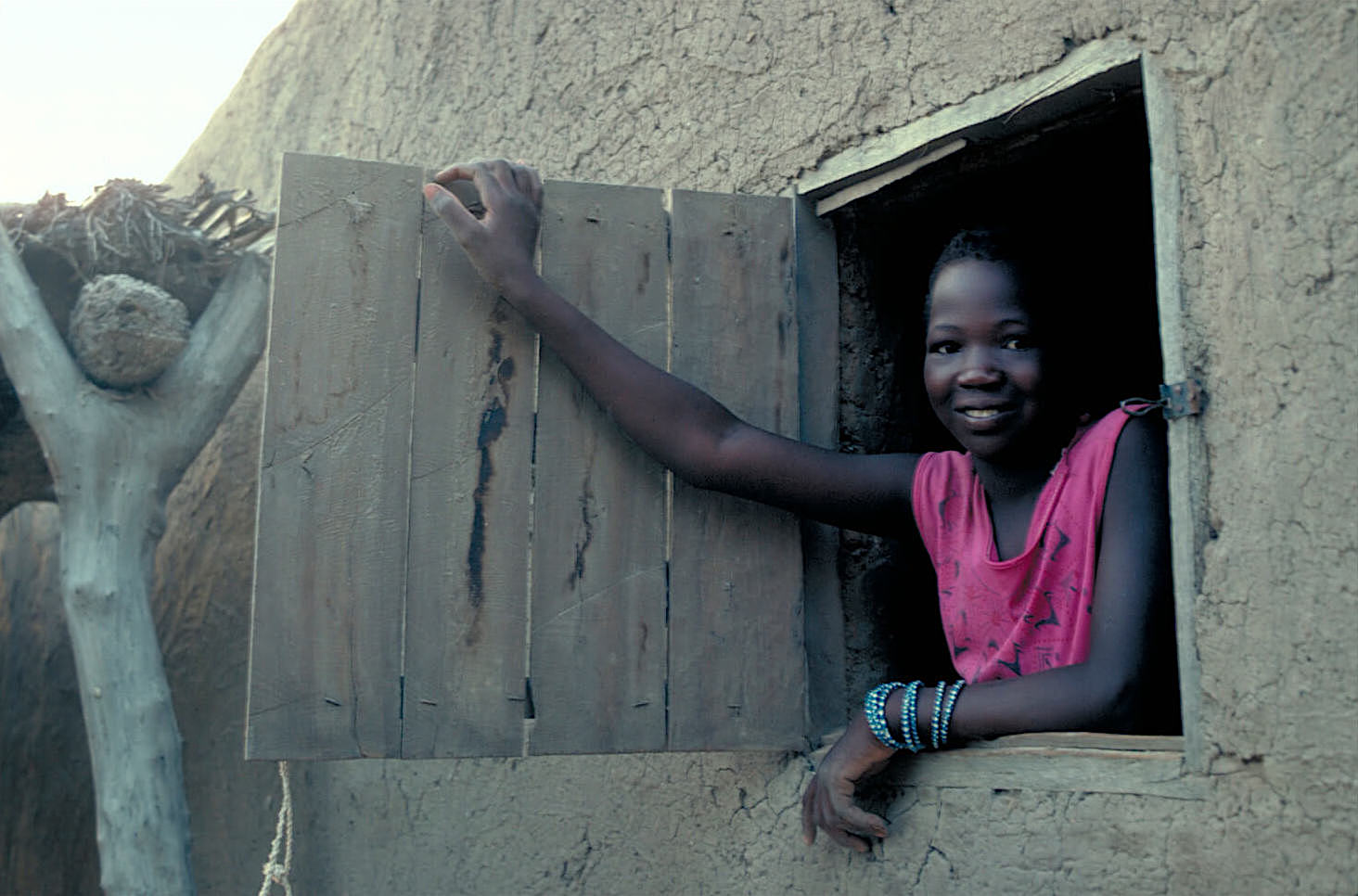
Putting knowledge into practice
5:50 Sitan tells Ladji the hot water is ready. He bathes in the privacy of the latrine, prays on the floor of his room, then comes to the courtyard to sit. This is a between-season period and Ladji is waiting for the harvest.
For most people in Mali, the pre-harvest time is one of worry, as there is little or nothing left to eat from the last season. Food prices are at their highest and many families must borrow against the next harvest from peasants who have surpluses. Ladji never wants to be caught in a debtor’s situation again. He has seen terrible drought and has lived through famine, so he has learned to make provision for these difficult situations. Standing in the courtyard are five big granaries filled with sorghum and millet to carry his family through difficult times if the wet season turns dry. He can sit smiling serenely. This year, he is well off.
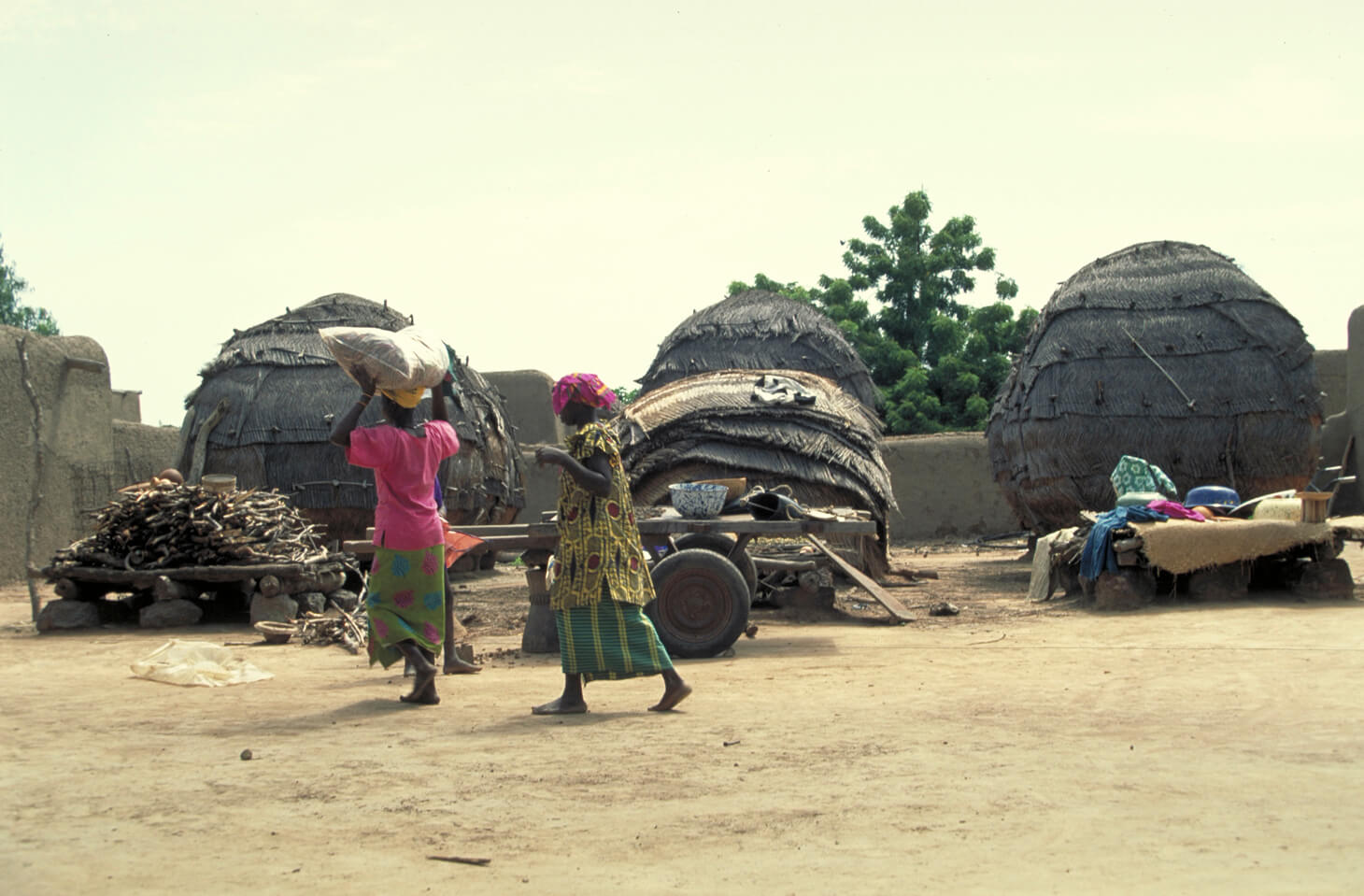
Soon she will be old
On her little stool in front of her house, Satou, the mousofôlo, looks up at the sun. The sun is her clock. It measures the hours, the days and the years. She was young before her marriage at 16. She will be old when she cannot bear children anymore and when her eldest son Aglae marries.
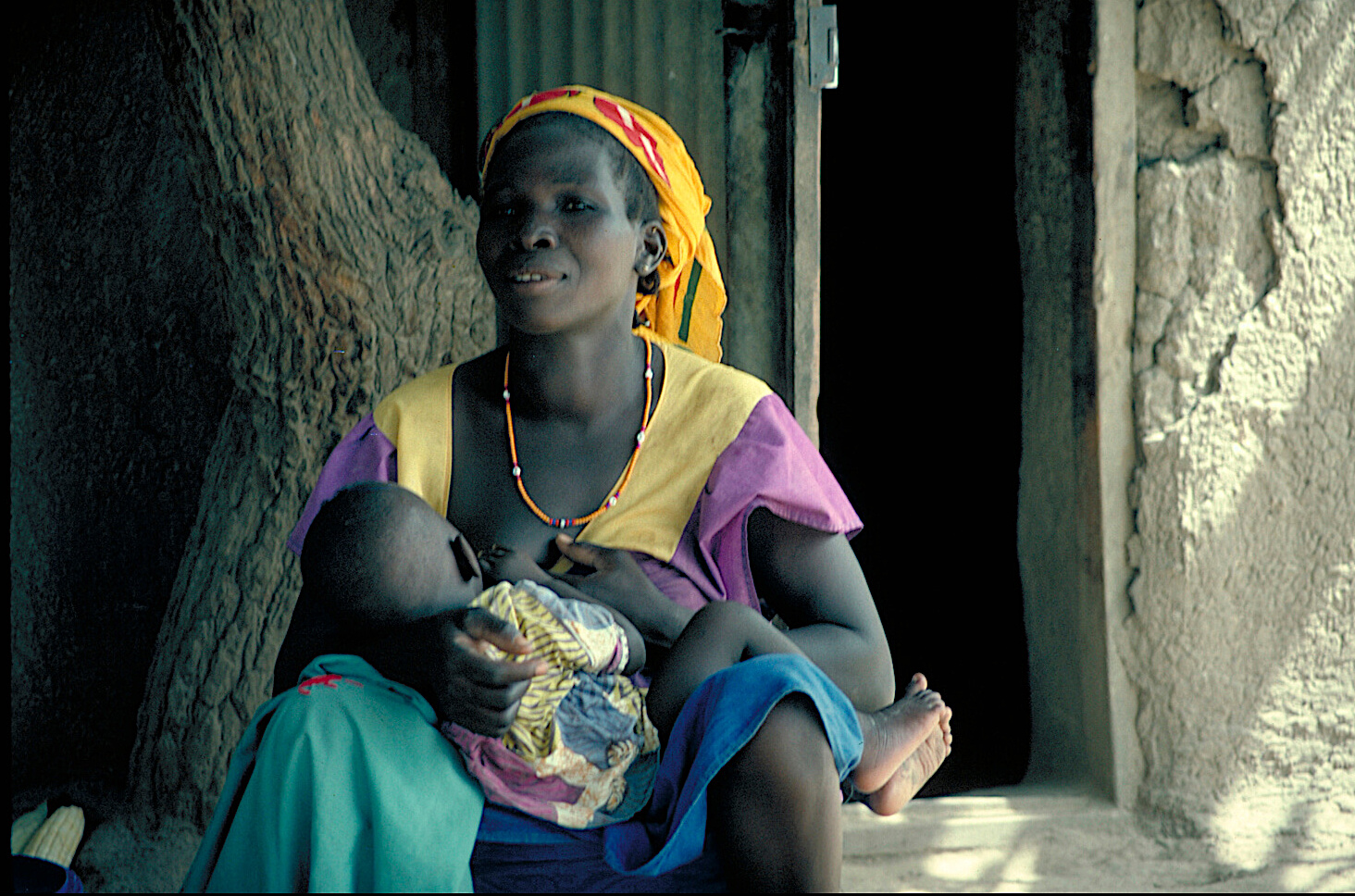
A wife is needed for Aglae
Twenty-one-years-old Aglae leaves for the fields with Amadou, his uncle and friend. The message has been passed throughout the community, and even to the extended family in neighboring countries, that a wife is needed for Aglae.
Family members living in Senegal sent a picture of an available girl. Aglae does not seem too enthusiastic about starting his own family yet.
Amadou has a gun, Aglae has a slingshot. They are going to keep the birds from eating the nearly-ripened crop. It is too wet today to plough the watermelon fields. Maybe they can do it tomorrow.
Sanata, the second wife, takes her turn at the well. Traditionally, it is Sitan’s work, but Sanata begins washing her husband’s and all the children’s clothing. The women have divided the daily tasks their own way to make the burden of the house and field work easier.
It’s going to be a hot day so Satou doesn’t want to delay fetching wood. She pulls her baby from her breast and gets up. Aramatou, Sofiatou and the other cousins follow. The girls imitate their mothers. They pound millet, carry children, fetch well water, sweep the yard and do all of the other chores.
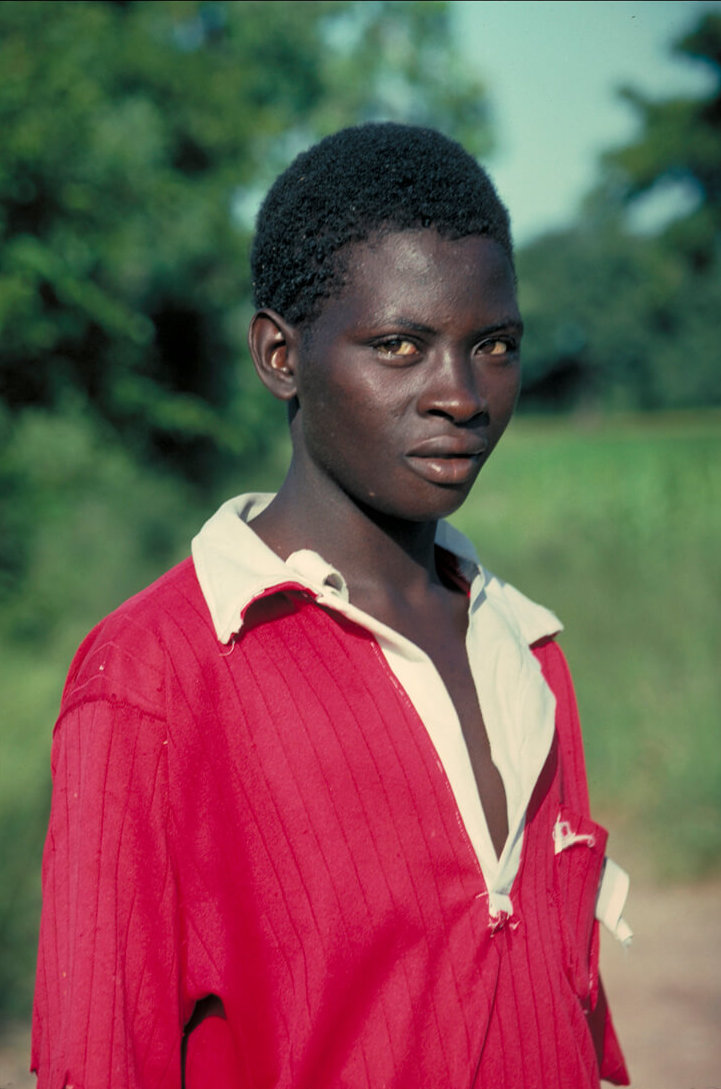
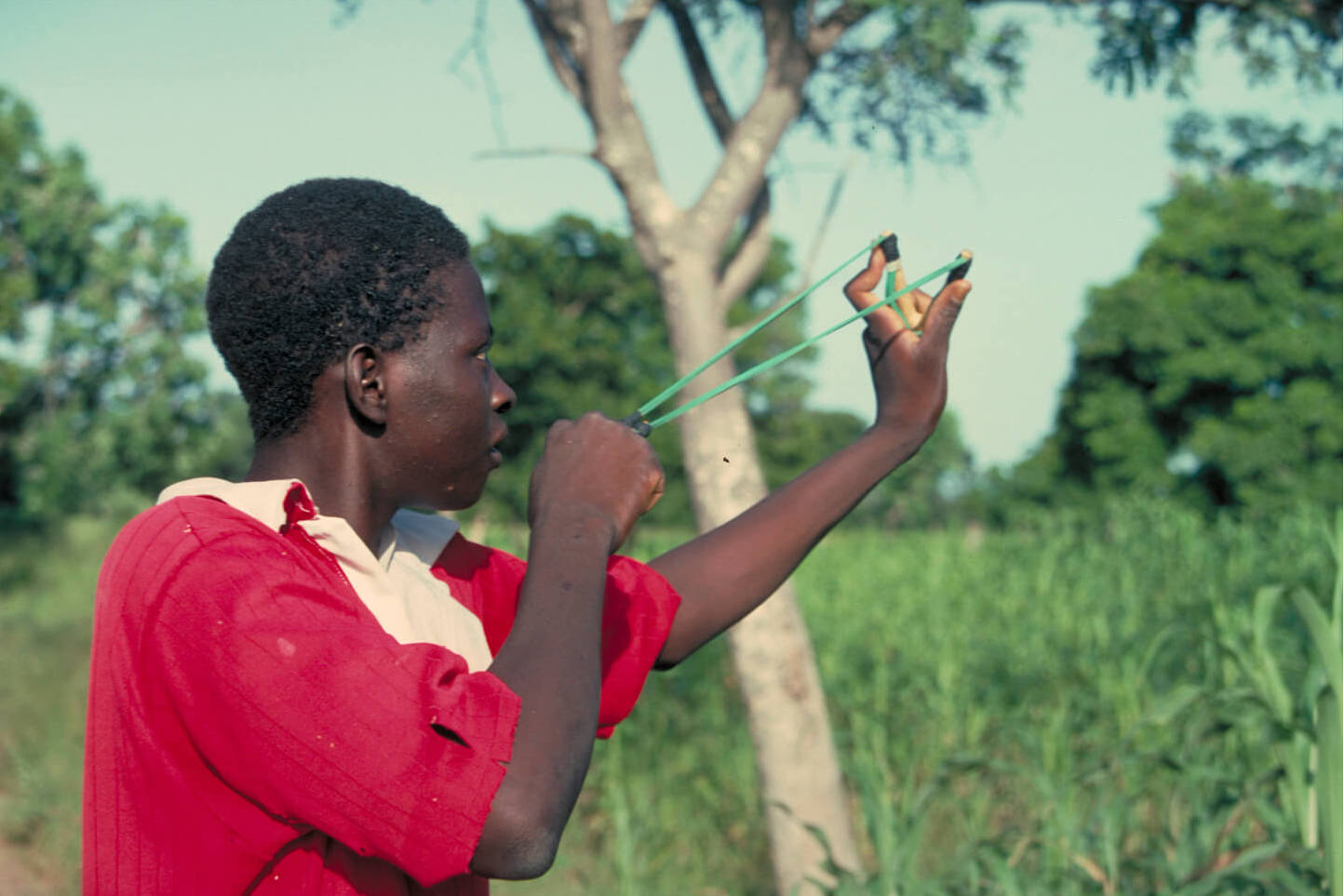
Ladji’s brothers’s wives join in the procession, crossing the fields to the uncultivated land. Sorghum and millet form a hedge on each side of their path. Cotton, rice, groundnuts, watermelon, and tikanikourou (white bean) grow in these fields. Gumbo used for sauces is planted around the crops. Wild nere plants and the karite nuts provide condiments, as does monkey-bread, the local name for the baobab fruit. The green fields and nearly ripe crops hide the sandy soil and the fact that this is the semi-desert land of the Sahel.
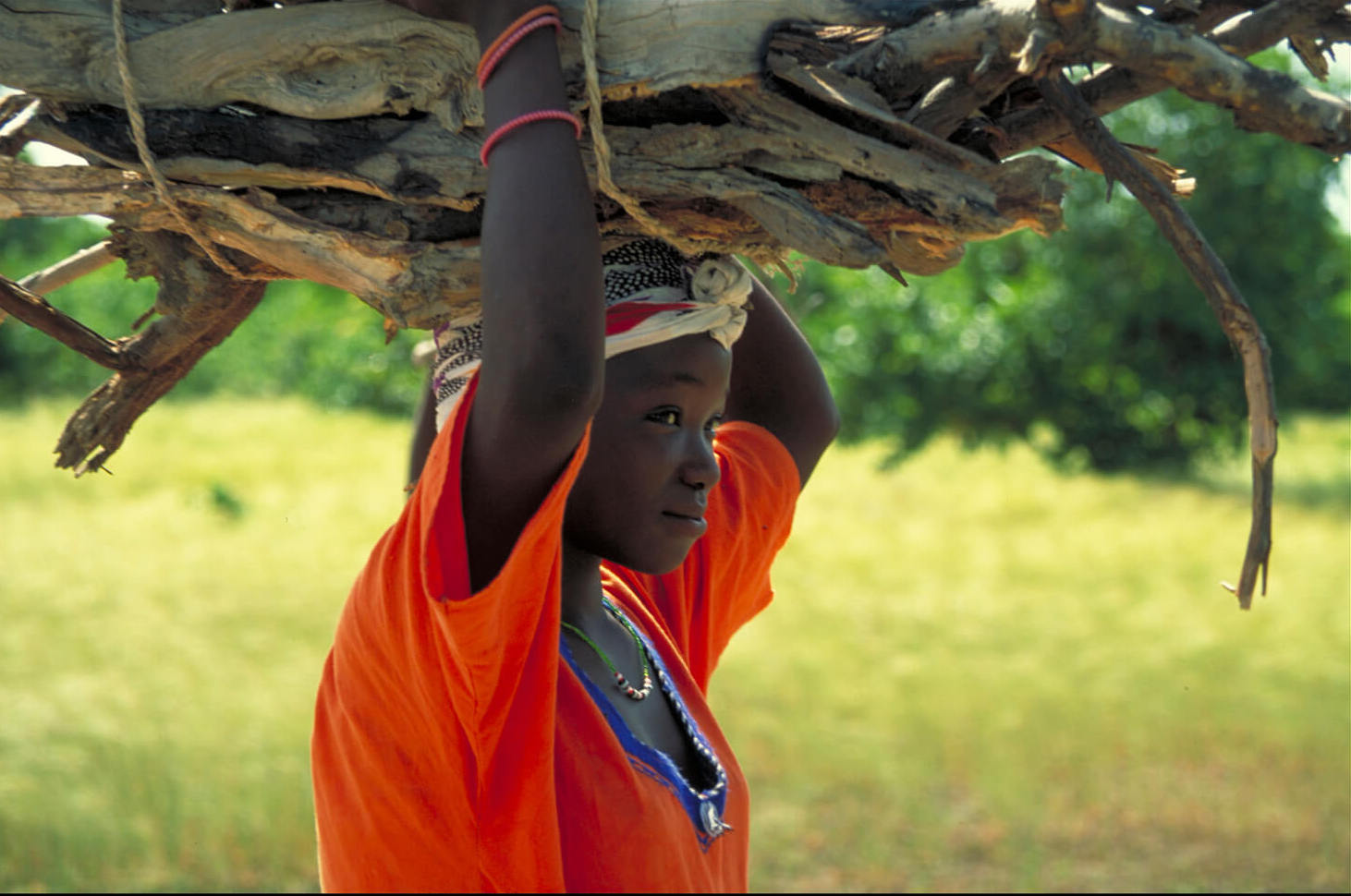
I give them what they want so they do not leave for the city.”
The cash earned from selling cotton and rice buys salt, sugar, dry fish, clothing, medication, motorcycles, bicycles, petrol, paraffin, lamp-wicks and glass lampshades, and even cattle. It also provides dowry money for prospective brides.
This year, Ladji asks the village chief, his uncle, for more land. There is plenty of land, enough for anyone who has family manpower to work the fields. Good production depends on the strength of the fertilizer and the amount of manpower. The more wives, the more children, the more workers. If the head of the family knows how to motivate all his kin, he can prosper. Speaking of his fields and wealth, Ladji says, “Some people have more, some have less.” In fact, most have less. Drained by the Bani, a tributary of the river Niger, Ladji’s region is one of Mali’s most productive.
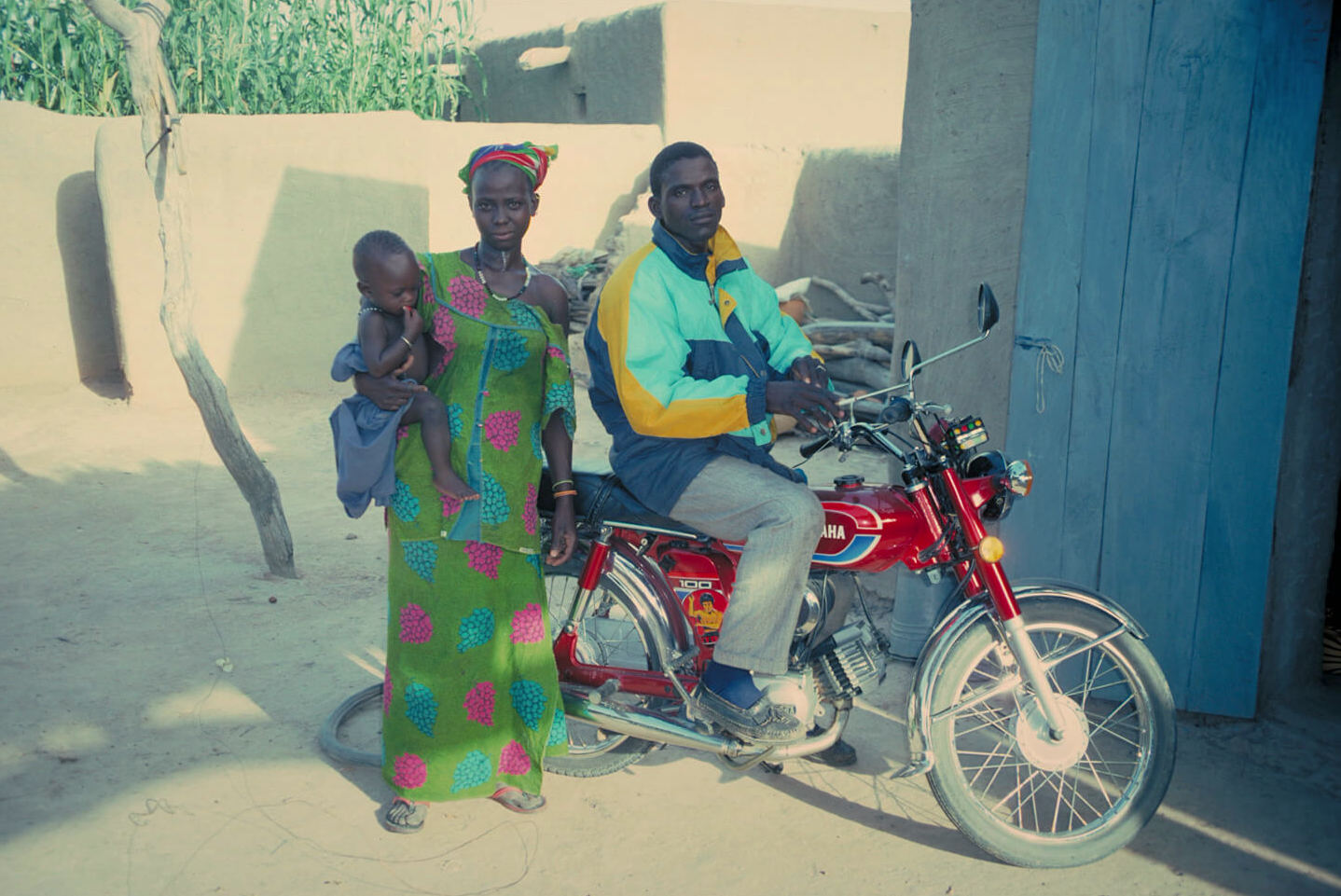
All their needs and wishes go through him
Old Soulouman heads the family until his death. Perhaps it is because he feels death coming, that he decided not to wait and transferred land and responsibility to his eldest son. Ladji is now responsible for his father and two wives, his two brothers and their two wives, his own three wives and all the children. All family members come to him for their needs. It is Ladji’s responsibility to feed, dress and house them.
All their needs and wishes go through him and it is he who says, yes or no, and decides the reward for each, according to the work done. Speaking of his brothers, he says: “I give them what they want so they do not leave for the city.” When they asked for motorcycles, he said yes.
Avoiding migration to the city is a major concern. Often, educated people leave their village. To keep people at home, the chief had refused funds to build a school for the last twenty years. But, when the neighboring village built a school, the chief changed his mind and finally agreed to accept the aid money. The village has now had a local school for three years.
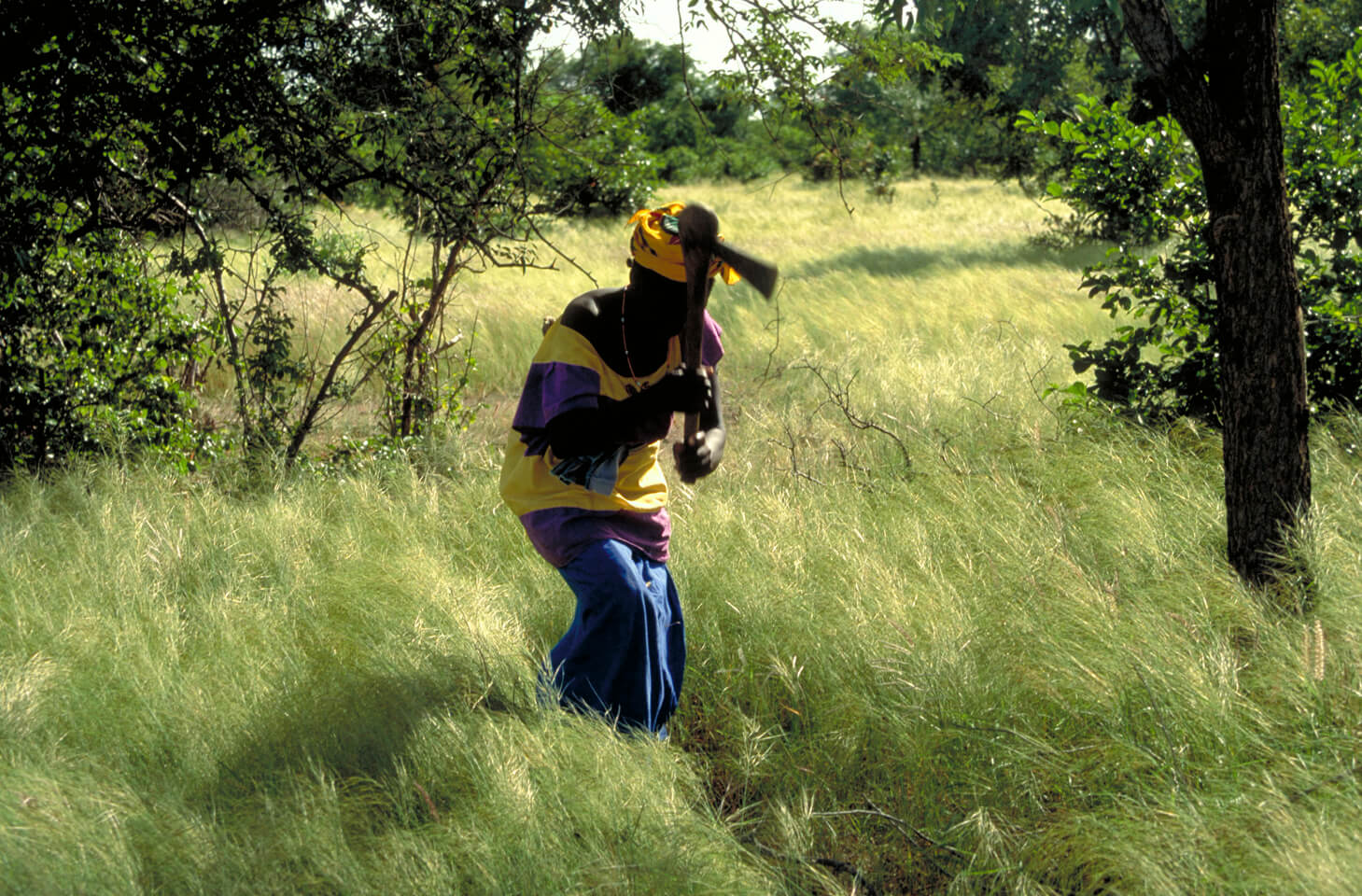
The more wives, the more children, the more manpower
9:30 Morning food awaits the women returning with dry branches on their heads. Sorghum porridge fueled their early morning work and now they are hungry. Cereal does not supply enough calories and two-thirds of the country’s women are anemic. Many children also suffer from malnutrition.
Sitan distributes the millet tô (porridge) in three large basins and the green gluey nogolan sauce in three small plastic containers. One is for Ladji and his brothers sitting in the shade, the second for all the wives and children in the second courtyard and the third for Soulouman Malle’s room, where one of his wives will help him eat. Saly, the youngest girl, brings every group a basin of water to wash their hands before and after the meal.
With the food dropping from their hands _ their only eating utensils _ the little ones will need to be washed from head to toe after the meal is over.
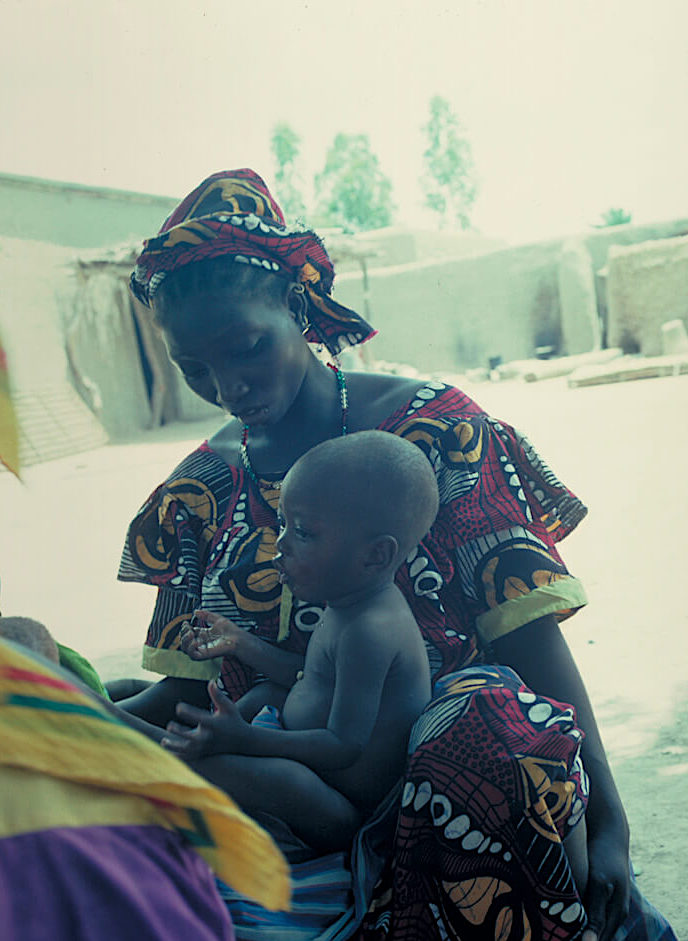
She knows about death
10:30 Sanata returns slowly from the fields where she brought food to Aglae, Amadou and the boys herding the sheep. On her way, she picked Kolobe leaves to treat her son Abassou’s malaria, which was diagnosed by the doctors.
Sanata is trying to save her last-born. She looks at her son Abassou with overwhelming sadness. He is a month older than 15-month-old Dialkaridia, the first wife Satou’s son, but he is abnormally smaller than his brother. His stomach is bloated and his legs cannot carry him. He cannot even crawl and hardly ventures a meter away from his mother.
Ladji has been telling her to take Abassou to her mother’s compound, a two-hour motorbike-ride away. Ladji’s cattle are kept near his mother-in-law’s house and there would be milk there for the child. Sanata’s mother would know how to care for her grandchild. Abassou is still nursing but has to make room for the new baby. Soon Sanata will go to Bla, the nearest town, to spend the last month of her pregnancy. There, she will be near a medical clinic where she will get help when she gives birth.
Sanata, sitting on the mat, looks down at her son lying across her knees. She caresses him and says,“Ladji is right, I know it would be best.” But she says no more. Sanata does not want to be separated from her son. She is afraid he will die and today she does not really want to speak about death. She has just come back from her father’s burial.
She knows about death. All of the women do. Satou and Sanata each lost two babies before their second year. And Made, Satou’s son, died at 17, just two months ago. He had gone to repair a family field well, took sick, and died. The well was closed, but this hasn’t eased the pain of losing him.
Just at the mention of his name, Satou’s voice changes to control her emotions. When asked how many children she has, Satou answers: “the dead and the living?”
Maybe it is because Sitan is the same age as her dead son that Sanata says she loves her like her own daughter and has made Sitan feel at home in the courtyard. Satou is a warm hearted person and did the same for Sanata. “Oh! I was so happy to see her, to have someone to share the work with.” says Satou. The three wives get along well. “We know how to live together as co- wives. Often, it is not so and women argue or ignore each other.”
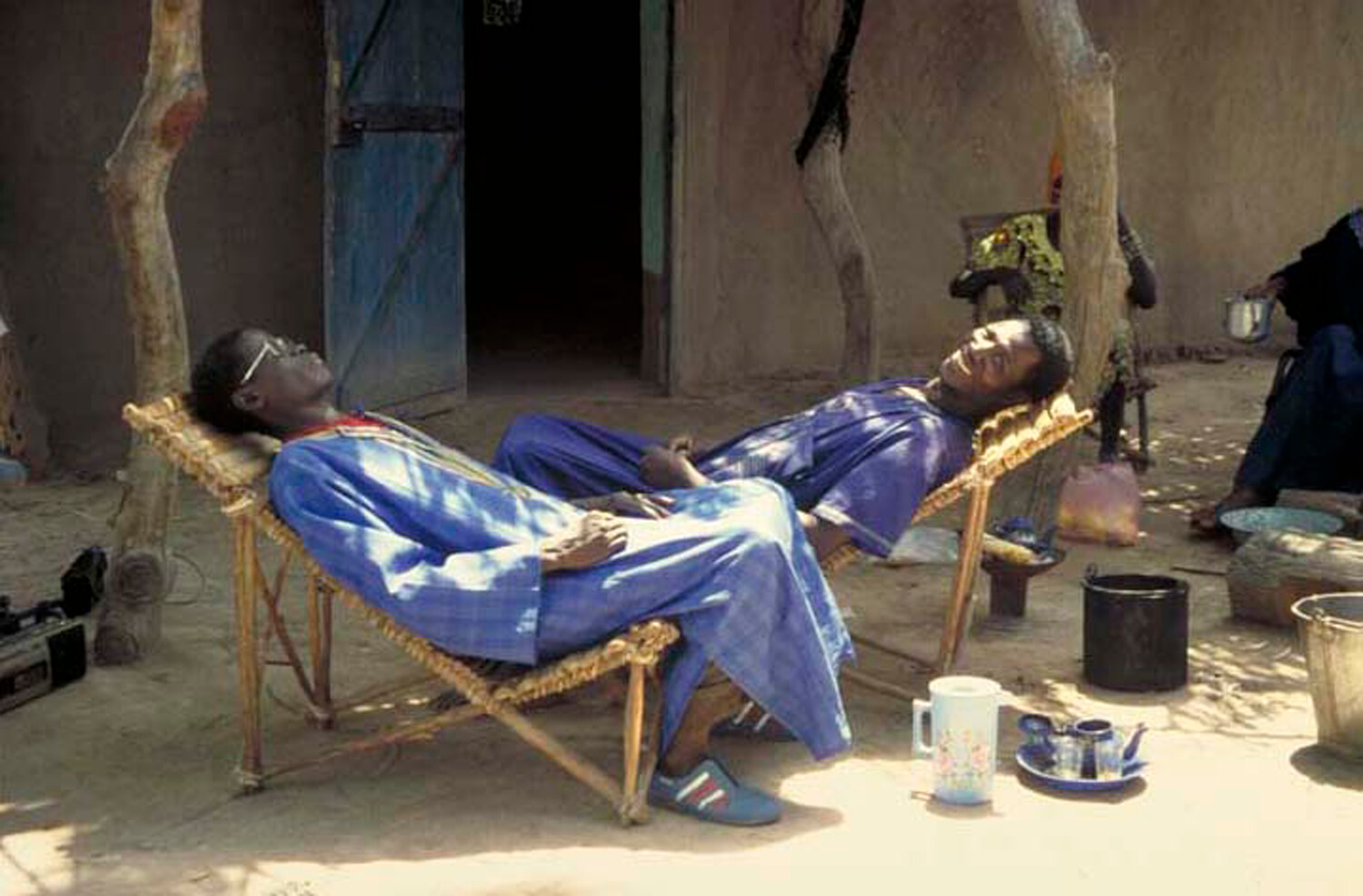
His original name was Djeriba
11:00 The radio is playing in the yard. It is a Muslim religious program. This morning, it explains the ritual of ja’naba (major ritual washing) and the way one must wash after sexual intercourse: first the hands must be washed three times; then, the genital area; next, the head and the right side of the body, three times from head to feet. Then the same operation must be done on the left side. “We live by the Koran,” says Ladji. Most of the Koran simply provides direction on how to manage your every day life.
When Ladji was five, his cousin taught him how to pray and he was given his Muslim name which means pilgrim. His original name was Djeriba, an animist name unacceptable for a new believer.
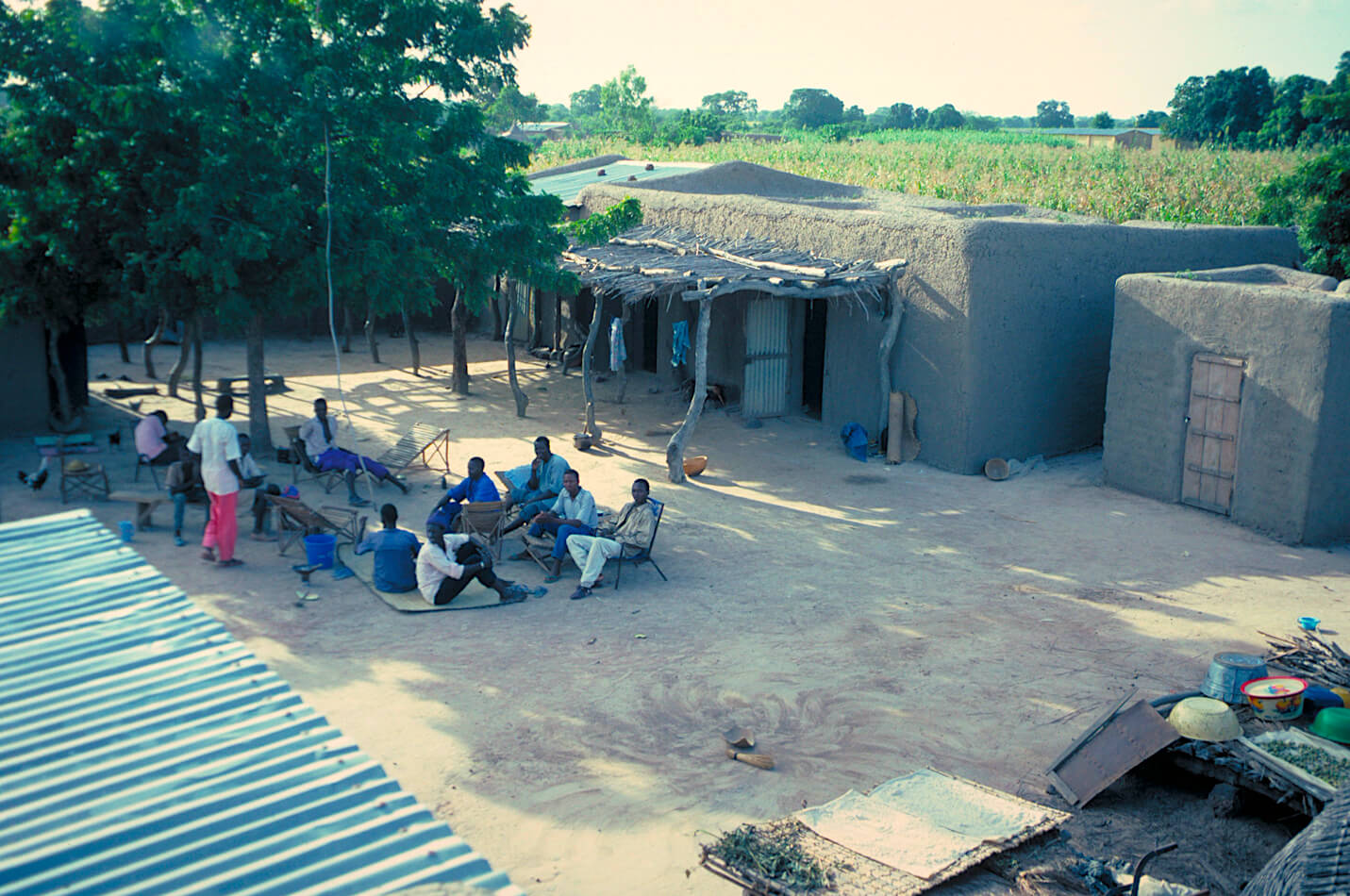
“Women and children do not have any conscience and they need to be beaten to teach them respect.”
12:00 Ladji returns from a meeting at the Compagnie Malienne de Développement du Textile (CMDT). Mali is an important cotton-growing country and its textile colors enliven the markets of many West African countries.
The 100 families of the village are members of the co-operative run by the government owned CMDT. Today, the heads of all the households meet to discuss their needs for fertilizer, cotton seeds and animals to pull the ploughs and hoes. Most importantly, they want to know how much they will have to pay for these services and how much the company will pay for their harvest. The company sets the prices and quotas. Cotton income contributes to Ladji’s family prosperity and perhaps also to his continuous smile. But, as he does not know when the years of drought will come, he does not really know if the cotton price on the world markets will be in his favor.
Ladji attends all meetings and represents his family’s views in the communal decision-making. He tries to ensure that decisions favour his family’s interests. He speaks to the village chief for the family members and manages the harvest.
In the midday heat, the women gather around a traveling salesman selling clothes that all look the same. They want to buy, but the little cash they have does not allow them to purchase much. Ladji does not encourage them. All he gives his wives for themselves is CFA 5,000 (US$10) and three bags of millet, sorghum and rice at each harvest. With this, they must meet their personal needs for the year. Ladji does not want his wives to have more income.
This is the reason why he has decided, after discussing it with the men, not to buy a grinding mill. They thought it could be useful but came to the conclusion there are enough women to pound the grain into meal by hand. “If I give them more time, more income and if they have nice dresses, they won’t love me anymore,” he says.
If he goes to the city of Bla, Satou, Sanata and Sitan cannot go out of the yard without his permission. Ladji admits naively that he beats his wives and, always smiling, he lists the events that deserve such a beating: “If she does not bring the hot water in time for prayers, if food is not ready when I am hungry, if they do not welcome me warmly.”
The popular saying goes that women are like children and Ladji’s neighbouring brother says: “women and children do not have any conscience and they need to be beaten to teach them respect.”
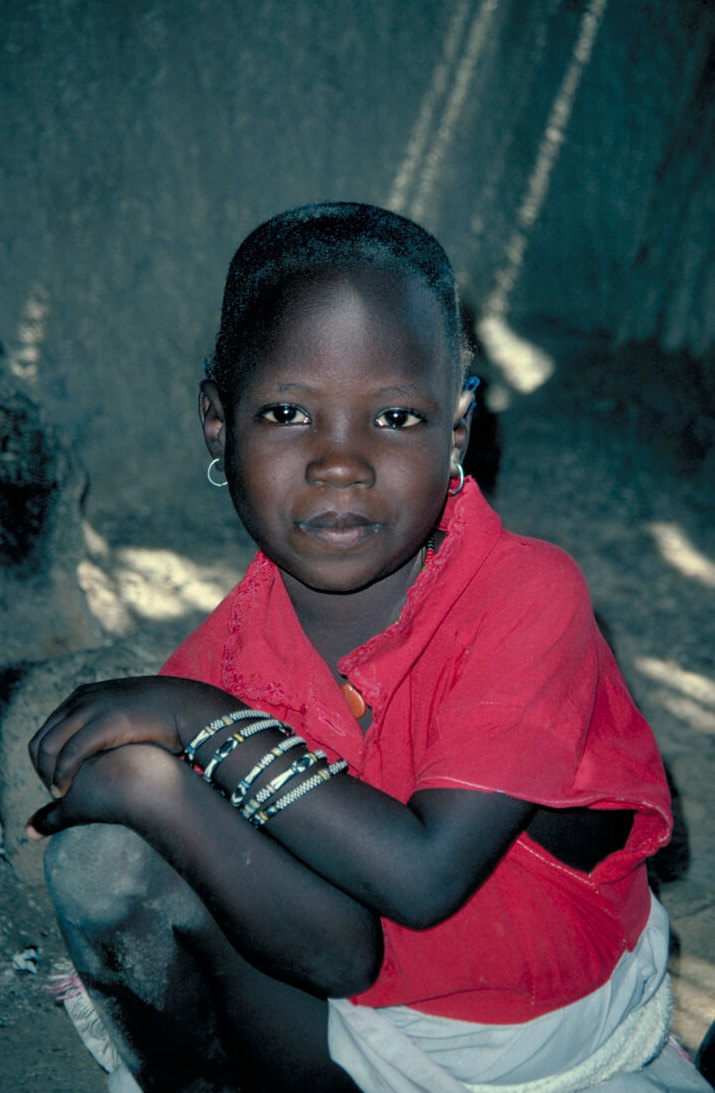
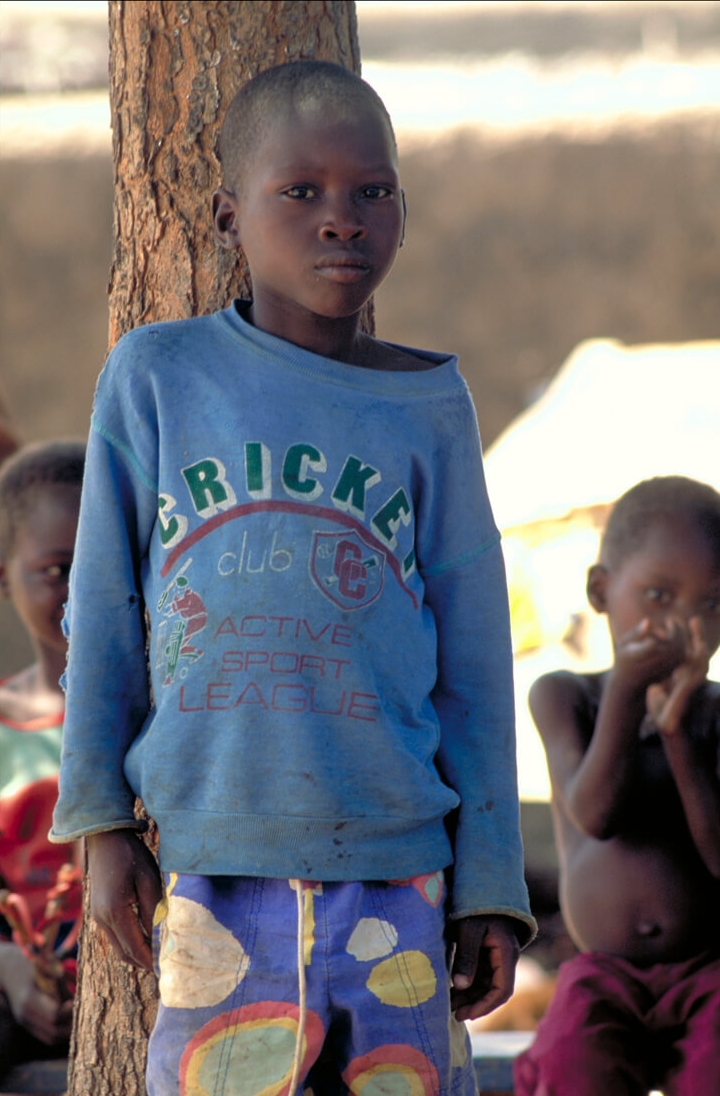
Two boys attend school, Arne and Mamouto
2:00 Three-year-old Alassane is mooning around Sanata. He wants more attention from his mother who is giving it all to Abassou, his sick brother. Most of the time, Alassane has to go to see the new wife, Sitan, or Satou, or his older sisters who do not interest him much today. Ladji calls him to come and sit beside him in his long chair. Alassane obeys and sits shyly besides his father until he puts his sorrows to sleep. Satou, who is using the hottest hours of the day to have a nap with her youngest child, is awakened. She is needed to fetch water for the men.
Satou gets up from the straw mat on the floor in the shade of her door, picks up a pail and walks to the well outside the courtyard. As she returns, two of the nine men who are having tea get up and, after washing, go into the shade nearby to pray. Women are not supposed to be seen praying.
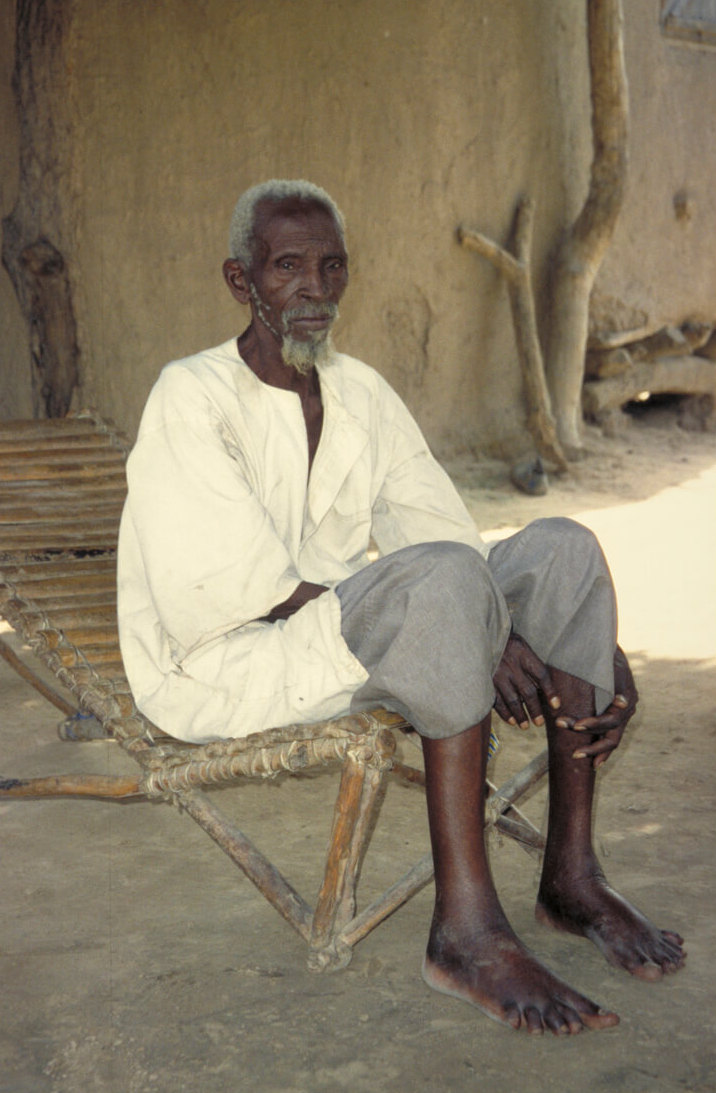
The great events serve as reference
“There are three men in the village who do not pray,” says Ladji, who does not usually talk numbers. Numbers are connected to magic, curses and to the taxes collected by the colonial power. He does not know how many people live in the village. He does not know the number of children he has, how many family members he feeds, how much he must plant and harvest to feed them all for one year, how much land he has. He does not know his family’s ages. Even registration papers read “approximately”. There is no paper for Soulouman Malle. Ladji says he is nearly 120.This would means his father would have been 75 when he was born. Ladji says he is not so old and that he must be over 70.“He was born just before his young brother, the village chief, who was 20 in 1949 when he was forcibly enlisted to fight for the French in the Indochina war,” he explains.
Age has no importance. It is the great events that serve as reference. The year of drought when one was born, of conflicts, of rituals and now there is the year when one begins school.
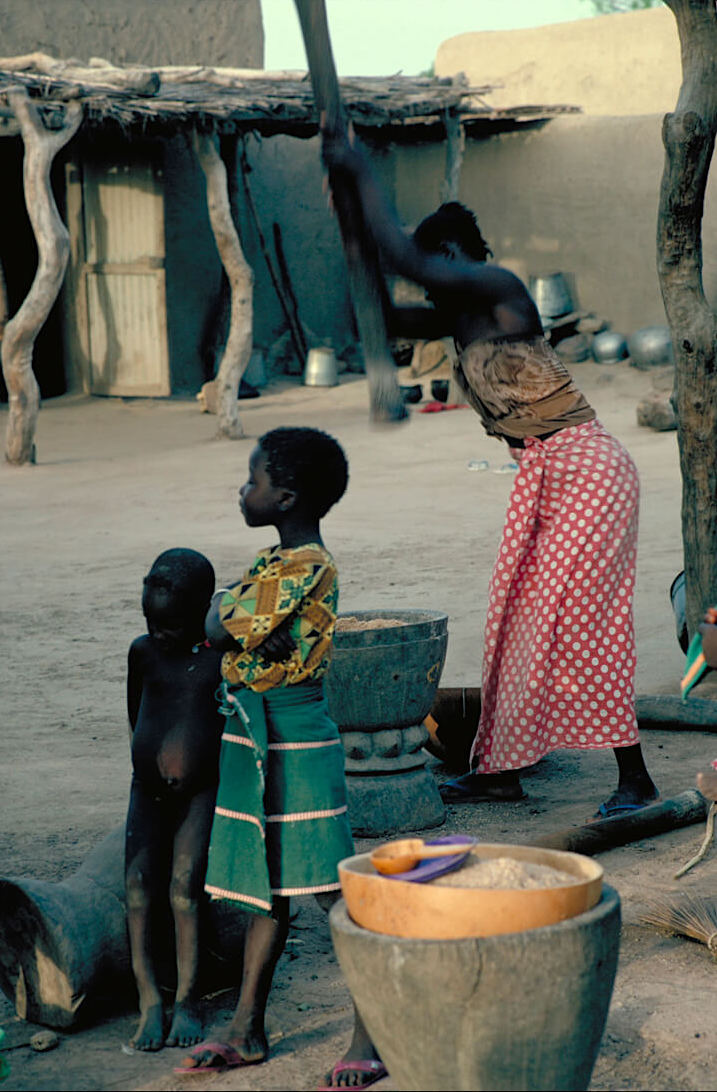
“It has been difficult to convince my father to send two boys to school”
3:00 Ladji walks to the school to register Arne and Mamoutou. Enrolment is every two years for the three classes with the two teachers and it is the last day to do so. “If one day one of my sons becomes a scholar or has an important position I will be happy,” says Ladji.“It has been difficult to convince my father to send these two to school.” Soulouman Malle does not like these changing times and did not agree in taking manpower away from the fields.
Most of the courtyard’s children are still too small to attend school and it is too late for the girls like Saly, Aramatou and Sofiatou. They are getting close to marrying age. At 14, Sofiatou is exactly the age Sanata was when she arrived as second wife and says she does not like the idea of leaving her family. Aramatou who seems to have inherited her father’s never-ending smile does not hide the fact that she would have liked to go to school. On her knees in front of the flat stone, she crushes the cooked karite nuts while Sofiatou makes little balls of them. Once heated, they will be used as cooking oil.
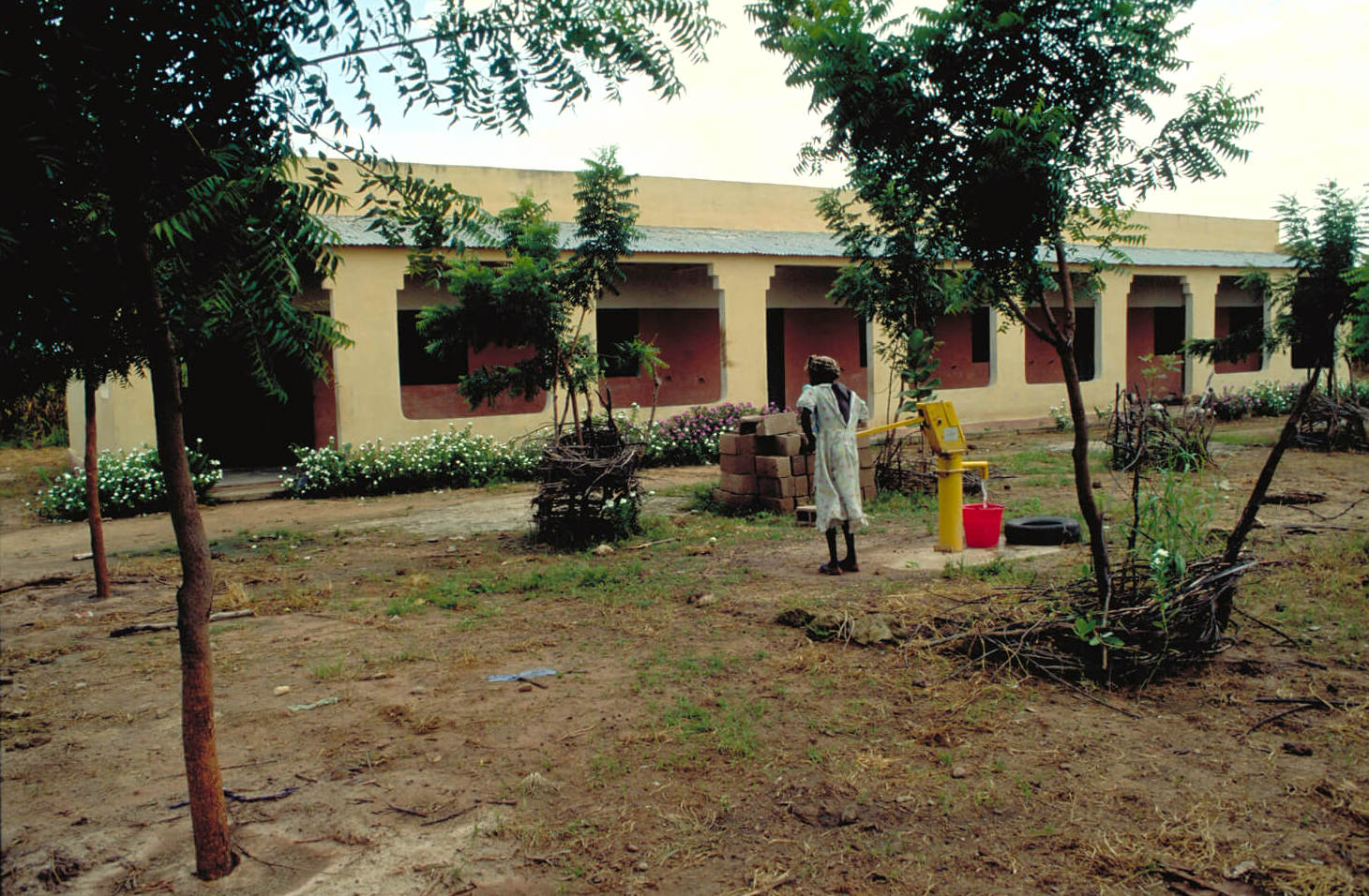
Millet pounding is the background sound in the village
3:30 Amatou and his brother Arne, returns home during the midday heat and leave again for the fields to bring the sheep closer to home before sunset. They meet Amadou and Aglae coming back with a wôlô (partridge) that Amadou has shot. The wild bird will add variety to the sauces accompanying the porridge eaten at all family meals.
An old man from a neighbouring village pays a visit to offer his sympathy to sick Soulouman Malle, who has been helped to sit in a chair outside his door. Soulouman’s legs are swollen and he is suffering, so after a few minutes he goes back to bed. The visitor departs leaving Ladji the traditional gift of a cola nut.
Music is heard from the other end of the village. The village has four divisions and one has hired “Griots” to sing and play music so they can dance. Griots, a caste found in all Sahel countries, pass on oral history in their songs. They are invited to marriages, feasts or just simply for a moment of joy, like the event today. The choice of the dance is determined by the event that is being celebrated. In line, one beside the other, the women dance to the same steps with their babies securely wrapped on their back. Today, the dancers emphasize the rhythms and movements by waving colorful strips of cotton to the beat.
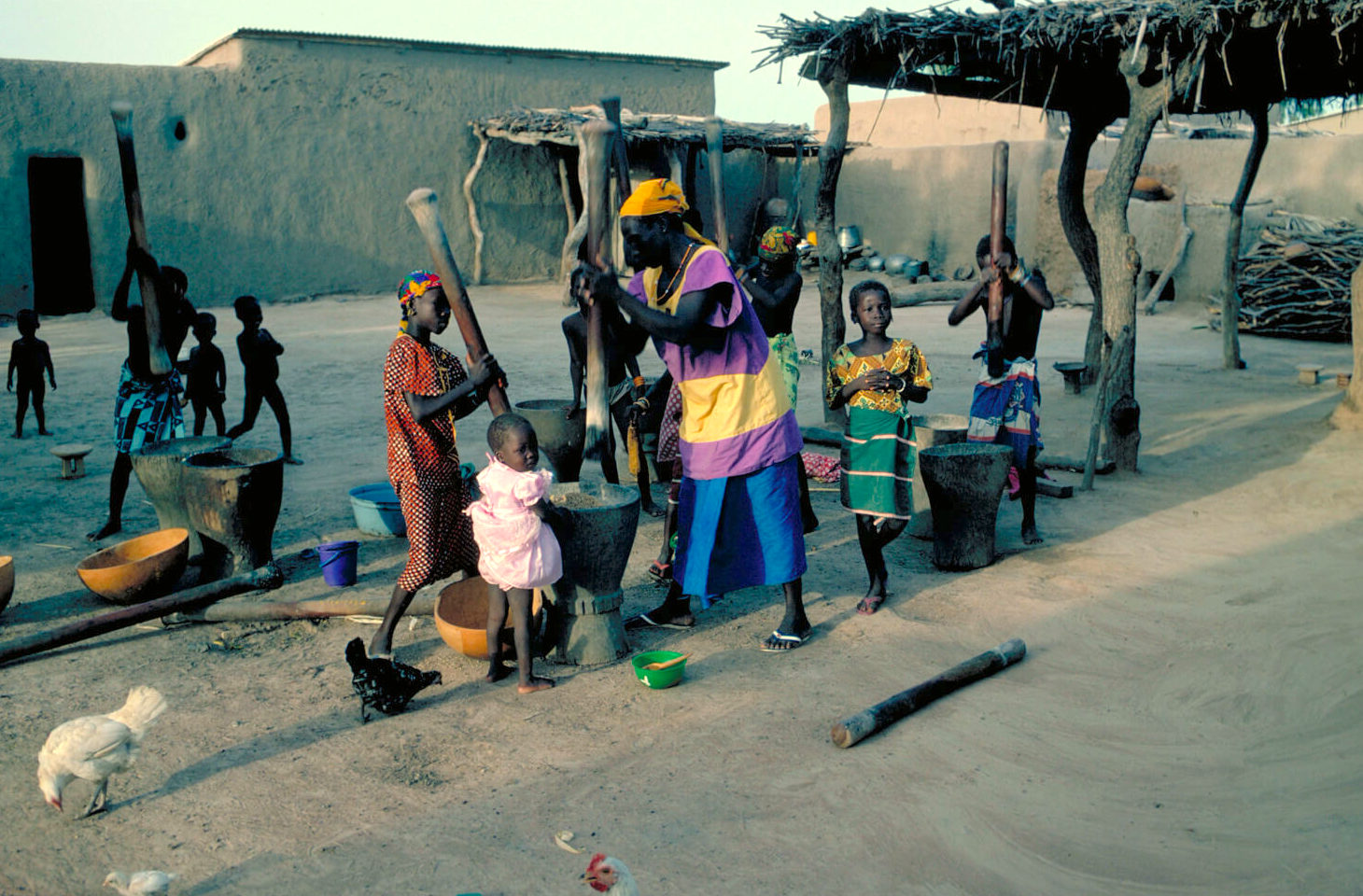
Who can we trust ?
6:00 The day collapses as if from its own heat. Satou and Sanata bathe the young ones while the other children dance to Aramatou’s singing. Fires burn and water is warming for the evening porridge.
7:30 Under a three-quarter moon, Aglae goes out to meet the young men of his own age group. It is with them that he has gone through his childhood and youth. They will be brothers all through life
The young men work together in a special field assigned to them. The income of this special field is used for their community activities such as hiring the Griot for dances. They proudly say that their work bought the television, video and generator used by everyone to see movies and the much appreciated musical shows.
Ladji sit with his friends. The men talk politics. The government in the capital city, Bamako, speaks of decentralization, the transfer of more power to the local and regional levels.
“They say we should have a communal government, but in which village will we construct the buildings ? From which village will we choose the person that will have these powers ? Who can we trust ?” the men grumble. Nothing can be said to convince the men to choose one solution or another. “No one can be trusted because everyone can be bought.” Sceptical of government projects, they add, “Politicians make great promises but once in power they forget the villages and keep the money.”
10:00 Satou and Sanata, who have fallen asleep outside with their babies, get up, grab their mats and go inside, locking their doors. No one walks about at night time. It is the time for spirits.
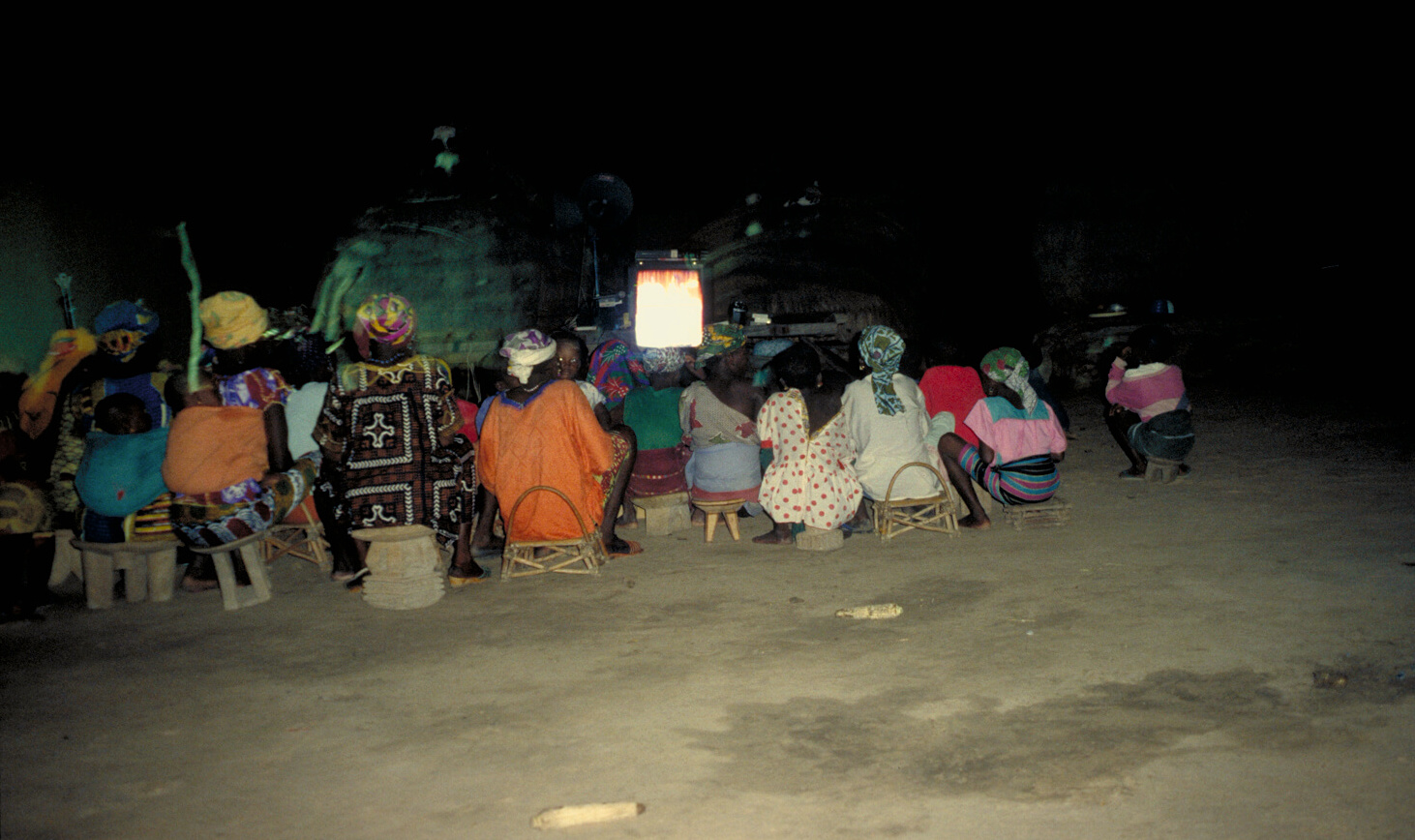
Everyone brings their touroum to sit on during projection night

